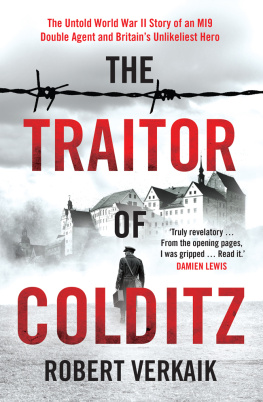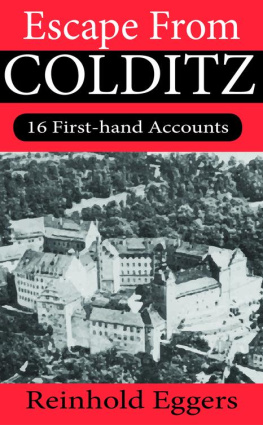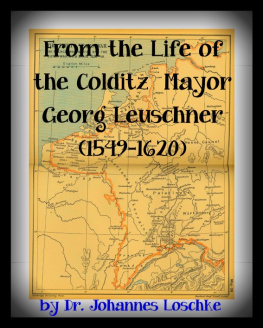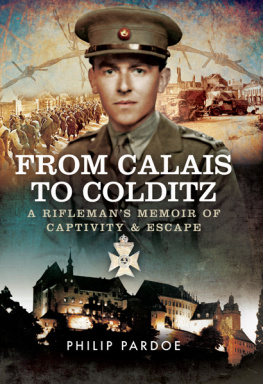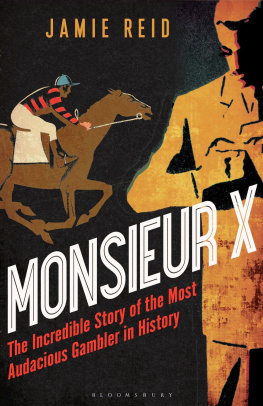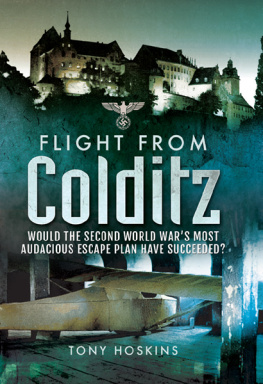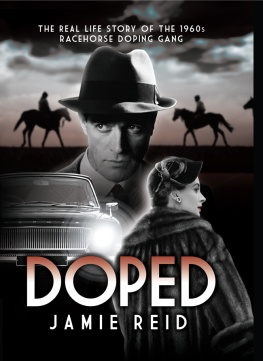P. R. Reid - The Colditz Story
Here you can read online P. R. Reid - The Colditz Story full text of the book (entire story) in english for free. Download pdf and epub, get meaning, cover and reviews about this ebook. year: 1983, publisher: Coronet Books, genre: Home and family. Description of the work, (preface) as well as reviews are available. Best literature library LitArk.com created for fans of good reading and offers a wide selection of genres:
Romance novel
Science fiction
Adventure
Detective
Science
History
Home and family
Prose
Art
Politics
Computer
Non-fiction
Religion
Business
Children
Humor
Choose a favorite category and find really read worthwhile books. Enjoy immersion in the world of imagination, feel the emotions of the characters or learn something new for yourself, make an fascinating discovery.

- Book:The Colditz Story
- Author:
- Publisher:Coronet Books
- Genre:
- Year:1983
- Rating:5 / 5
- Favourites:Add to favourites
- Your mark:
- 100
- 1
- 2
- 3
- 4
- 5
The Colditz Story: summary, description and annotation
We offer to read an annotation, description, summary or preface (depends on what the author of the book "The Colditz Story" wrote himself). If you haven't found the necessary information about the book — write in the comments, we will try to find it.
The Colditz Story — read online for free the complete book (whole text) full work
Below is the text of the book, divided by pages. System saving the place of the last page read, allows you to conveniently read the book "The Colditz Story" online for free, without having to search again every time where you left off. Put a bookmark, and you can go to the page where you finished reading at any time.
Font size:
Interval:
Bookmark:
THECOLDITZSTORY
THE COLDITZ STORY
P. R. Reid
... challenges comparison with any of the escape stories of World War II. It is men who think (and write) like this who do what these men did.
The Daily Telegraph
,.. is for all who like tales of excitement and adventure well supported by technical detail.
All is action. Yet he writes with an attractive simplicity and amiability and an intuitive fellow feeling.
The Observer
... is written with a disarming modesty, never false, often amusing and generally most intelligent, that almost conceals the remorseless qualities behind it.
H. E. Bates, The Sunday Times
Also by the same author, and available in Coronet Books:
The Latter Days at Colditz
The Colditz Story
P.R. Reid
M.B.E., M.C.
CORONET BOOKS
Hodder Paperbacks Ltd., London
TO MY WIFE JANEY
First published July 1952 by Hodder & Stoughton Ltd.
Coronet edition 1962
Seventeenth impression 1974
This book is sold subject to the condition that it shall not by way of trade or otherwise be lent, re-sold, hired out or otherwise circulated without the publishers prior consent in any form Of binding or cover other than that in Which this is published and without a similar condition including this condition being imposed on the subsequent purchaser
Printed and bound in Great Britain for Coronet Books, Hodder Paperbacks Ltd., St. Paul s House, Warwick Lane , London , EC4P 4AH by Cox & Wyman Ltd., London , Reading and Fakenham
ISBN 0 340 02406 2
APOLOGIA
Escape books are sometimes said to make escaping more difficult for the future, but the escape stories of the First World War made the majority of POWs in the Second World War escape-conscious. In the First World War escapers were an uncommon breed of men. A spirit was created by the early books which throve and bore fruit.
Minor escape techniques may have been made public by these early books, but they are never criticized for that by the escapers of the Second World War. Besides, much was left unsaid, and that applies even more to the stories of todaythanks to the authors who have deliberately omitted many details of enthralling interest. The different conditions of life in Germany were what our generation was really up against: the Gestapo, the Allied bombing and the Hitler Youth. Big Bertha cannot be compared to Allied air bombardment, nor can Allied air bombardment be compared to guided, stratospheric, atomic warhead rocket missiles. It will be the new conditions which will be the obstacles in the future, not escape books. The inspiration of escape books lives in mens memories and serves to keep alive the spirit of adventure.
ACKNOWLEDGMENTS
This book, written ten years after the events it portrays would not have materialized without the help of many friends. They are, one and all, former Colditz POWs.
It has been necessary to omit from this edition the drawings by John Watton (who shared my captivity) with which the cloth-bound editions published by Hodder & Stoughton Ltd. are illustrated.
Other officers, former Colditz inmates, who have helped me are: Flight Lieutenant H. D. Wardle, Lieutenant Commander W. L. Stephens, Major P. Storie Pugh, Lieutenant-Colonel A. Neave, Captain K. Lockwood, Captain R. Howe, Colonel G. German, Major H. A. V. Elliott, Major R. R. F. T. Barry and Captain A. M. Allan.
Major Elliotts many contributions and unstinted help have been of especial value, and I am grateful to Captain Allan for his correction of the German in the text.
I have been fortunate, too, in finding the whereabouts, on the Continent, of several ex-Colditz POWs of the Allied armies: Dutch, French, and Polish. Lieutenant-General C. Giebel, Major P. Mairesse Lebrun and Lieutanant F. Jablonowski (in the U.K. ), in particular, have kindly given me their assistance.
Lastly, to my wife I owe much, for her comments and for her untiring help in the preparation of the material of the book.
P. R. R.
A plan of Colditz Castle is on pages 80-81
CONTENTS
PROLOGUE
APPRENTICE
I. ESCAPE RECONNAISSANCE
II. THE FIRST BID FOR FREEDOM
III. THE PRICE OF FAILURE
ESCAPE OFFICER
IV. THE FORTRESS PRISON
V. ROUTINE
VI. THE SECOND TUNNEL
VII. THE COMMUNITY OF NATIONS
VIII. THE HEAVY PALLIASSE
IX. FRENCH DASH AND POLISH TEMPERAMENT
X. JUST TOO EASY
XI. DUTCH PORCELAIN
XII. THE RIOT SQUAD
XIII. A STAGED FOURSOME
XIV. THE INFORMER
XV. WINTER MEDLEY
XVI. THE RHINE MAIDEN
III. ESCAPER
XVII. THE 1942 FEELING
XVIII. ESCAPE STRATEGY
XIX. FORLORN HOPE
XX. THE WALLS ARE BREACHED
XXI. LIBERTY EXPRESS
EPILOGUE
When I was a boy at school, I read with avidity three of the greatest escape books of the First World War.
They were: The Road to En-Dor by E. H. Jones, The Escape Club by A. J. Evans, and Within Four Walls by H. A. Cartwright and M. C. C. Harrison. All of them, as exciting reading, are as fresh today as when they were first published.
These three epics lived long in my memory, so that when the fortunes of war found me a prisoner in an enemy land the spirit enshrined in them urged me to follow the example of their authors.
A. J. Evans said that escaping is the greatest sport in the world. In my early twenties I thought that to ride in the Grand National Steeplechase at Aintree would be the epitome of sporting excitementmore so even than big game hunting. I longed to do both. Since the war and my experiences as an escaper, my one-time ambitions have died a natural death. I feel I have quaffed deeply of the intoxicating cup of excitement and can retire to contemplate those unforgettable moments of the past. I can think of no sport that is the peer of escape, where freedom, life, and loved ones are the prize of victory, and death the possible though by no means inevitable price of failure.
The Second World War had just come to a close when A. J. Evans wrote some further memoirs in a book he called Escape and Liberation, 1940-1945. In it he wrote: The whole story of Colditz will, no doubt, one day be told, and it will make an enthralling story; but it must be written by one of the men who was there.
This book is the story of Colditz. I was one of the men imprisoned there.
We called Colditz the bad boys camp; the Germans called it the Straflager. An officer had to pass an entrance exam before being admitted through its sacredthe French would say its sacreportals. The qualifying or passing-cut test was the performance of at least one escape from any one of the many Prep.-school camps that were dotted all over Germany . Naturally, the qualifying escape exam was not set by the Germans, nor were full marks a guarantee of entryin fact, the contrary, for the hundred per cent candidate was never available to take up his vacancy. He was out of bounds and, happily for him, expelled for good!
Unfortunately, the nearer the applicants marking came to a hundred without actually attaining it, the more certain he was of finding a wooden trestle bed and straw palliase awaiting him in Colditz.
The reader of this book, I feel, would also like to qualify before entering Colditz. He should run the gauntlet as hundreds of us did and pass the exam. So, in order to get him into training, he will, I hope, forgive me if he does not reach Colditz until Chapter IV. If he has read many escape books and is an old-timer, he may skip the early chapters. But at least in my qualifying exam I escaped as a womanalmost the only feminine interest in the book, I am sorry to sayso it might be worth while....
When the reader eventually arrives at Colditz, I shall not waste his time with details that every escaper knows. All the other inhabitants are professionals, and professionals do not demean themselves with the lesser problems. In fact, there will not be time to go into all the details, for that was Colditz.
Font size:
Interval:
Bookmark:
Similar books «The Colditz Story»
Look at similar books to The Colditz Story. We have selected literature similar in name and meaning in the hope of providing readers with more options to find new, interesting, not yet read works.
Discussion, reviews of the book The Colditz Story and just readers' own opinions. Leave your comments, write what you think about the work, its meaning or the main characters. Specify what exactly you liked and what you didn't like, and why you think so.

